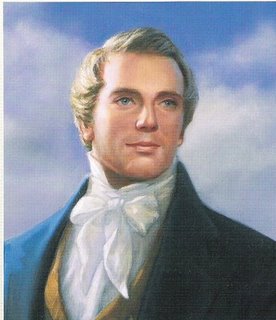By Doris
Joseph Smith was promised that his name would “be had for good and evil among all nations” (Joseph Smith—History 1:33), and that promise certainly continues to be fulfilled today. While some recognize Joseph Smith as a prophet called of God to restore the fulness of the gospel of Jesus Christ on the earth in the last days, other see him as a fake who made a lot of lucky guesses. As archeology continues to reveal ancient documents that corroborate much of what Joseph said, however, it is becoming increasingly difficult to discredit him.
 Faithful members of The Church of Jesus Christ of Latter-day Saints (often misnamed the Mormon Church) recognize that Joseph was a prophet. They also recognize that the Book of Mormon cannot be proved or disproved by men. While there are powerful archeological findings that seem to disprove occurrences in the Book of Mormon record, there are many other things that Joseph Smith would have had absolutely no way of knowing when the Book of Mormon was “written” unless he received those things through inspiration. The power of the Book of Mormon lies within God’s promise to its reader that if they ask Him in faith whether the record is true, He will manifest of its truthfulness through the power of the Holy Ghost. The witness of the Holy Ghost does not depend upon discoveries of men (which often seem certain only to be disproved years later by another finding), but speaks truth and peace directly to the soul.
Faithful members of The Church of Jesus Christ of Latter-day Saints (often misnamed the Mormon Church) recognize that Joseph was a prophet. They also recognize that the Book of Mormon cannot be proved or disproved by men. While there are powerful archeological findings that seem to disprove occurrences in the Book of Mormon record, there are many other things that Joseph Smith would have had absolutely no way of knowing when the Book of Mormon was “written” unless he received those things through inspiration. The power of the Book of Mormon lies within God’s promise to its reader that if they ask Him in faith whether the record is true, He will manifest of its truthfulness through the power of the Holy Ghost. The witness of the Holy Ghost does not depend upon discoveries of men (which often seem certain only to be disproved years later by another finding), but speaks truth and peace directly to the soul.
Joseph Smith has received a lot of criticism not only for claiming to have translated the Book of Mormon from an ancient record by the power of God, but also for claiming to have translated the Book of Abraham from an ancient papyrus that came into hand of the early Saints. Many things in the Book of Abraham that were not known at the time Joseph translated it, but have been proven accurate after decades of further discoveries and research.
Listed below is a short list of some of the things Joseph could not possibly have known at the time he wrote them down, unless they were made known unto Him by God. These things have been proven accurate today by subsequent findings and are very specific in nature. This list is taken from the article, “How could Joseph know all of this?” by Daniel Peterson, professor of Islamic studies and Arabic at BYU.
Abraham 1:10 references the “plain of Olishem” in the land of Chaldea
Though this name does not occur in the Bible, it does occur in an inscription dating to about 2250 B.C., referencing the same place in what is today northwestern Syria.
Facsimile 1 names four idols
Three of the four names have been confirmed so far by ancient texts.
Facsimile 1, figure 9 identifies the crocodile as the “idolatrous god of Pharaoh.”
The Pyramid Texts of Pharaoh Unas (ca. 2350 B.C.) say, “The King Appears as the Crocodile-God Sobk.” Other areas of this text further verify the accuracy of Pharaoh as a crocodile.
Facsimile 1, figure 12 identifies the angled lines, containing a crocodile, below the lion couch as symbolizing “the firmament over our heads.”
Ancient Egyptians conceived the sky as “a heavenly ocean” where the crocodile swims.
Facsimile 2, figure 6 depicts four figures representing “this earth in its four quarters.”
Ancient texts suggest this is also accurate.
The Book of Abraham attributes extensive astronomical understanding to Abraham, though the Bible does not.
Many post-biblical texts, including Jubilees and the Quran identify Abraham as an astronomer. Josephus portrays Abraham as “a man . . . skillful in the celestial science” and a man who taught astronomy to both Egypt’s priests and to Pharaoh himself.
Abraham 4 records Abraham’s vision of the creation and notes that God organized pre-existing materials rather than creating something from nothing.
Traditional Christian doctrine says that God made the universe from nothing, but this does not appear in the Bible. Rather, Christian thinkers who allowed themselves to be influenced by Greek philosophies and changed the doctrine in the second century. Ancient Jewish writings, however, teach that God created the universe by forming preexistent matter.
Again, Latter-day Saints realize that there is archeological evidence that seems to prove both sides of many debates for the Book of Mormon and the truth that Joseph Smith was a prophet of God. It is only by gaining a confirmation through the Holy Ghost, through pure inquiry and seeking truth, that one can gain a true testimony of this work. However, things like this are very compelling. There is no way that Joseph Smith could have known of these things because none of these discoveries had been made during his lifetime.
If you wish to see Peterson’s full list, read his article “How could Joseph know all of this?”
